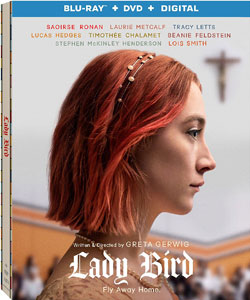“Lady Bird,” now available from Redbox, didn’t totally connect with me, and since the glowing theatrical reviews and awards are long since in, that statement says more about me than writer Greta Gerwig’s directorial debut. Coming-of-age films tend to be more personal than other genres; I got peeved in the early Aughts if anyone thought my beloved “Ghost World,” “The Good Girl” or “Garden State” were less than brilliant. So if “Lady Bird” is the most personally fulfilling movie a particular viewer has ever seen, they’re not wrong.
I will say this: Gerwig’s love for her hometown of Sacramento shines through. Even the clips playing behind the DVD menu are gorgeously warm and loving. The thrift store racks, bridges, painted storefront signs, classrooms and 1970s-vintage houses emphasize its status as California’s Midwestern town (a negative trait to Saoirse Ronan’s Lady Bird). Throw in the film’s 2003 time period – when I, like Lady Bird, was moving away to start a career – and I would’ve been crying during the final montage if it was my hometown being shown instead.
While “Lady Bird” is engrossing and left a smile on my face throughout, it didn’t connect with me on a deep level because Lady Bird herself is such a cipher. Not quite to a “Napoleon Dynamite” degree, she acts and reacts and behaves, but doesn’t demonstrate any feeling. (“Lady Bird’s” gags flirt with “Napoleon”- or Alexander Payne-level absurdity, like a multi-layered one-off joke about how Lady Bird has been cast as “the tempest” in the school play.) This isn’t a knock on Ronan’s acting; this is how Lady Bird (given name: Christine) is, and the point about a teenager trying to figure out her identity – heck, even her personality — is well taken.
Still, I wondered if better movies could’ve been made about aloof hot guy Kyle (Timothée Chalamet), whose knowledge and theories about the U.S. government’s actions are mainstream by today’s standards but paint him as a nut in the wake of 9/11. Or about Lady Bird’s best pal Julie (Beanie Feldstein), who is in love with her math teacher. That notion gets shut down in a nicely understated scene (actually, everything is understated in this film) after a staging of the school play: The teacher congratulates Julie, introduces her to his pregnant wife, and departs. There was never any romantic spark there, and we see Julie now realizes it.
Gerwig, though, isn’t making a film about the wise-beyond-his-years teen or the in-love-with-her-teacher teen. Those stories have been told elsewhere. “Lady Bird” is about a normal teen from the early part of the millennial generation. It may sound weird to use “normal” to describe this girl who dies her hair red, gives herself a strange nickname, engages in social encounters as if she has pre-scripted them, and doesn’t stop to consider other people’s feelings (she utterly destroys her religious school’s anti-abortion speaker, very much earning her detention).

But Lady Bird is very normal. A viewer sees myriad signs of her family’s economic struggles. They are front and center in the mind of the practical mom (the excellent Laurie Metcalf), who believably alternates between those fears and trying to throw her daughter some overt love kernels. Like a curse she can’t shake, she bounces back to a practical observation about her daughter’s life, which Lady Bird is not geared to take.
But Lady Bird isn’t thinking about her family’s economic status in a practical or even fearful sense, although she does make jokes about living on the “wrong side of the tracks,” and she does pine after a big blue house on the other side. Oblivious to the good financial sense of attending UC-Davis, she wants to go to a liberal arts college out east, thinking that’s where the key to her identity lies.
There’s a subtlety to “Lady Bird” that I appreciate more when thinking about it than when watching it. The film’s meaning, such as it is, comes together quite nicely when Lady Bird realizes she was already shaped by Sacramento, and by her mom and dad, and that her hometown and family will always be a part of her identity.
We don’t know what’s next for her, and this is another unusually true observation for this genre: She has graduated from high school, but that’s not an “ending.” Lady Bird’s “coming of age” story won’t ever be “over,” partly because of how she’s wired and partly because, frankly, no one’s life is definitive while they are still living.
Gerwig recognizes this truism, and “Lady Bird” has no interest in a firmly upbeat or downbeat conclusion about its titular character’s life path. A viewer can’t know Lady Bird because she doesn’t know herself; heck, this bird has barely hatched. That very realism makes the movie easy to appreciate, but hard to embrace. At least for me.

